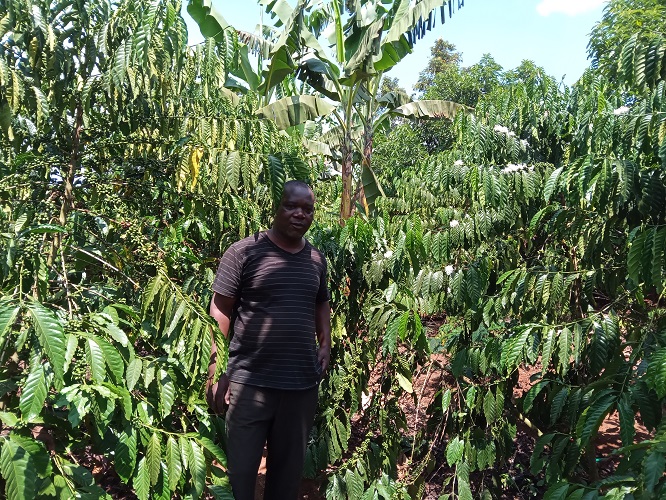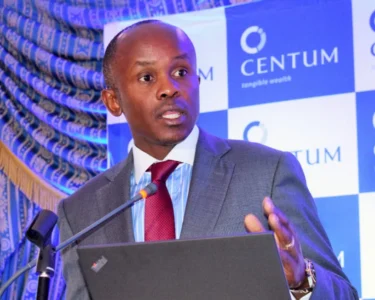When politicians leave the stage, many are often remembered for their fiery speeches, their campaigns, or their battles within Parliament. Few, however, write an entirely new chapter that shifts the focus from politics to the soil. Former Rubaga North legislator Moses Kasibante has chosen the latter path, carving out a new identity not in front of cameras or microphones, but on farmland where he now invests his energy, time, and money.
It is on a seven-acre stretch in Katulaga Cell, Nanziga Ward, Kyengera Town Council—just 27 kilometres along the Kampala–Masaka Highway—where Kasibante is quietly shaping his post-political career. Here, coffee thrives under his watch, intercropped with matooke, and nourished by irrigation during the dry spell. A recent visit found the ex-MP, not in a suit or addressing a rally, but operating sprinklers and attending to the crop with the diligence of a man who knows his livelihood now depends on the harvest rather than the ballot. His hands-on presence is a statement: politics may ebb and flow, but farming offers a more grounded certainty.
Kasibante’s passion for agriculture is not new. Born in Butambala to a family of coffee growers, his earliest memories are steeped in the rhythms of farming life. “I am a son of a farmer. My school fees mainly came from coffee,” he says, recalling the sacrifices that carried him from his village to Kampala in 1989 after finishing Primary Leaving Examinations. As a teenager living with his uncle in Buziga, he studied at Ggaba SS and later St. Peter’s Nsambya. But beyond the classroom, he spent evenings and weekends on his uncle’s twelve-acre coffee farm, absorbing the fundamentals of agronomy long before he thought of entering politics. What looked like youthful chores at the time would later define his survival strategy when his parliamentary career ended.
It was in 2015 that Kasibante seriously ventured into commercial farming, beginning with piggery. By 2017, armed with heaps of manure from the piggery, he made a bold move into coffee, intercropping it with matooke despite local skepticism that the two crops could not coexist productively. Instead of bowing to doubt, he invested in good agronomic practices—proper spacing, disease-resistant clonal varieties, and irrigation. The results silenced critics: his plantation today looks lush and healthier than many in the same region. He has since expanded to 13 more acres of coffee in Gomba, alongside a piggery project that he says will soon be back to full scale after a swine fever setback.
Kasibante’s farming philosophy revolves around soil management, organic practices, and independence from nature’s unpredictability. His sloping land is laced with trenches to curb erosion, nitrogen-fixing plants to enrich the soil, and organic manure—collected from animals, domestic waste, and even processed human urine—to boost yields. “Crops are like human beings. You need to speak to them every day,” he notes, insisting that commercial farming requires deliberate effort, not wishful reliance on rain. His irrigation system, powered by a 50-foot well, a petrol pump, and gravity, ensures coffee flowers throughout the year. For him, irrigation has removed the concept of “seasons” in coffee farming.
The scale of production is steadily rising. His coffee trees, planted in phases, now yield more than 20 bags, with projections of up to 60 sacks of dry cherries this season. Coffee buyers call him directly, ready to pay Shs6,500 per kilogram of green beans, while his matooke—fed with generous organic inputs—fetches Shs20,000 per bunch, largely demanded by households, weddings, and traditional ceremonies in the surrounding semi-urban setting. The piggery, too, is slowly regaining momentum. With two high-roofed pigsties designed for ventilation and fitted with Indigenous Micro Organisms (IMO) systems to eliminate odour, he anticipates a restocking that could soon return him to the level of producing over 600 piglets, each fetching Shs150,000.
Running two farms—Kyengera and Gomba—requires manpower. He maintains four permanent staff at the urban farm and six in Gomba, supplementing with seasonal workers during harvests. Yet, like most farmers, he faces challenges ranging from counterfeit inputs, unreliable labor, theft of produce, to limited government control over nursery operators and agricultural shows. He argues that state institutions like the Uganda Coffee Development Authority should tighten oversight to protect farmers from unscrupulous suppliers.
But while farming now occupies his daily routine—he draws up a personal timetable to ensure he is present during critical tasks—Kasibante has not abandoned politics. To him, farming is not a retreat from public life but an extension of it. “Politics is about organizing society. But you can’t organize society if you are not organized yourself,” he explains, framing farming as a demonstration of discipline, resilience, and economic independence that all politicians should emulate. He rejects the notion that losing a seat should leave a leader destitute, instead positioning himself as proof that with land and effort, a politician can reinvent and remain influential.
In fact, Kasibante is using his farm as a classroom. MPs, councilors, local leaders, and ordinary Ugandans visit to learn from his model, often leaving inspired to embrace agriculture. His message to young people is especially striking: “If you have two acres of land in Uganda, you don’t need to run to the Arab world for work. We have rivers in every village, fertile soils, and a comparative advantage that farmers abroad would envy. What excuse do we have?” For him, farming is not only survival but also a way of rewriting the narrative of dignity and self-reliance for Uganda’s youth.
Still, he remains critical of government initiatives such as the Parish Development Model (PDM), which he dismisses as political packaging rather than a tested, transformative approach. “What people need is market access, fair prices, and information on post-harvest handling. Not political slogans,” he says.
Kasibante’s story is more than a personal journey from Parliament to the plantation. It is a reflection of resilience, a case study in rebranding after politics, and a reminder that in Uganda, land remains the truest measure of wealth and survival. Where others see farming as risky, he sees it as liberating. And in doing so, he is quietly reshaping not only his destiny but also the perceptions of an entire generation about what comes after politics and where true power lies—perhaps not in a seat in Parliament, but in the soil under one’s feet.






